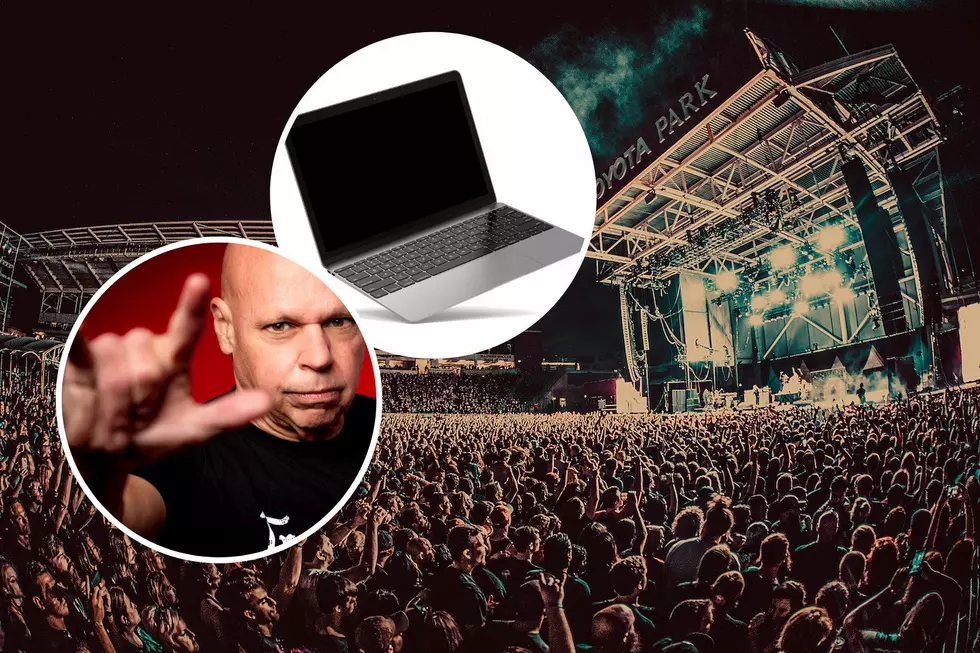
Let’s Talk About the Backing Tracks / Laptop Debate – Is It Really That Big of a Deal?
One of the hottest and most controversial topics sparking debate on social media recently is whether or not real rock bands use laptops or backing tracks to enhance their live performances — and whether that should be considered cheating.
Although it’s not a new subject by any means, it caused a stir of conversation when Falling In Reverse had to cancel a festival gig because their laptops, which included some harmony vocals, had gone missing. Some rock purists only see this in black and white and are quick to proclaim that real rock artists don’t use tracks at all — but, I beg to differ.
I believe that as long as it is not dominating the performance, it's not a big deal. A vocalist such as Ronnie Radke gives it his all every night — and he has every right to use tracks to enhance his live performances. There are many layers and complexities to what many of your favorite new or current rock artists create in the studio, and this is nothing new in rock.
This does not make a band a fraud or phonies. Although the technology has improved and is lightyears ahead of where it was when many classic rock artists were originally touring on their seminal albums, using backing tracks is nothing new. And we aren’t talking about when artists were forced to lip-sync on TV because the studios weren’t set up for live performances — that’s something different.
As a rock historian and music enthusiast my entire life, I have done thousands of artist interviews from Paul McCartney to Ozzy. I have been in rock radio and television for almost four decades, written a book, spoken in over 100 music documentaries and I’ve seen thousands of shows since I was a teenager in the 1970s. Some of the greatest rock shows I have ever seen have included backing tracks.
As a young boy, I was lucky enough to see Queen with the great Freddie Mercury perform at the Beacon Theatre in 1976 before they graduated to arenas and stadiums. They were supporting their brand new album at the time, A Night At The Opera.
They used a projector and played a track during the operatic part of their trailblazing video for “Bohemian Rhapsody.” There was no possible way for them to recreate the vocal layering with three singers on a live stage, but the fans wanted to experience the entire song. Nobody in that audience was upset that they ran tape and video for that part of the song.
Pink Floyd, The Who (with tracks from their two masterpieces Who’s Next and Quadrophenia) and many others have also been running tracks since the ‘70s. Does that make them any less relevant or take away from the fact that everything else is live and they played their hearts out?
I’m not going to name names, but yes, I have seen bands who rely too heavily on backing tracks, and I probably wouldn’t put down good money to see them again.
There is a fine line. I want my singers to sing and my musicians to play. If a band plays with passion, power and conviction, but — for the sake of continuity — have to use some backing tracks to fill out the sound, I am cool with it as long as it doesn’t dominate the show.
The problem comes when a band is using them as a crutch and putting on a lackluster, uninspired set, which is definitely not acceptable in the rock community. Part of the magic of rock and metal is the raw chaos of a live performance. You just can't fake that. It doesn't have to be perfect, but it has to be real and make you feel something.
Before I wrap things up, there are two things I want to point out:
First, many classic rock bands are using tracks whether that is obvious or not to the critics and naysayers.
Second, some of the new, up-and-coming bands who use tracks for backing vocals and extra instrumentation can only afford to take a certain number of musicians on the road. Often they must operate with the bare bones because of the expenses of touring. Does that mean they shouldn’t go out on tour and bring their music to their fans?
I don’t want to see any lead vocalist lip-syncing. That is not acceptable in the rock and metal genres. But, before you judge the new rock artists who are doing their best to recreate the music their fans have come to love and appreciate, remember, if it was good enough for Freddie Mercury, arguably one of the greatest singers in rock history, it’s good enough for me.
Bands Who Have Admitted to Using Backing Tracks
More From Noisecreep










